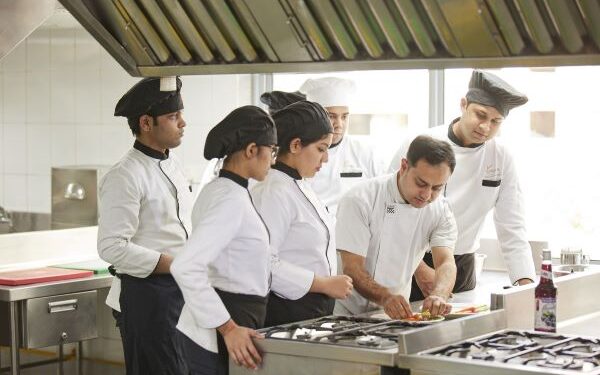By Chef. Sanjay Sharma Head of School, Culinary Excellence, Vedatya
The culinary tourism market is experiencing rapid growth. The industry’s value is expected to skyrocket from USD 1,160.7 billion in 2024 to USD 5,627.2 billion by 2034. This surge is fueled by a growing desire for authentic local experiences. Food exploration has become a cornerstone of modern travel, offering a deeper connection to diverse cultures and unforgettable experiences.
Accordingly, the field of culinary arts has evolved remarkably over recent years. No longer confined to the traditional settings, it now offers a dynamic array of career possibilities. Today’s culinary professionals can explore a variety of roles. From media and blogging to entrepreneurship and research, the field is rich with opportunities for those who embrace innovation and adapt to evolving trends. Staying updated with technological advancements and leveraging educational resources will be key to achieving success in this vibrant industry.
The McKinsey Global Institute highlights how technological advancements and shifting consumer preferences have revolutionized the industry, creating diverse new opportunities for those in the culinary field. The integration of technology has had a profound impact on culinary arts. Smart kitchen appliances in the kitchen. These appliances have revolutionized cooking processes by offering precise temperature control, automation, and remote operation. This technology allows chefs to focus on creativity and flavor, while also enhancing convenience and accessibility in the kitchen.I nnovations such as liquid nitrogen cooking, edible dust, and foam-based garnishes have revolutionized food preparation and presentation.
Many chefs have gained prominence as television hosts and food critics, making a name for themselves on TV and online platforms. Figures like Nigella Lawson and Vir Sanghvi have demonstrated how culinary expertise can translate into influential media careers, offering insights and critiques that reach a wide audience. Prominent chefs such as Atul Kochhar, Gordon Ramsay, and Vikas Khanna have showcased how culinary careers can extend beyond traditional roles. Their success illustrates that culinary professionals are increasingly recognized as key players in global food culture and innovation.
In this happening world of culinary arts, careers and opportunities are keep adding. Some roles that have emerged in the past few years include:
Food Bloggers and Vloggers: Social media has opened up new avenues for culinary professionals. Platforms like Instagram and YouTube have become powerful tools for chefs and food enthusiasts to share recipes, cooking techniques, and reviews. This digital shift has led to the rise of food bloggers and vloggers who can connect with a global audience and turn their culinary passions into profitable ventures.
Food connoisseurs: Specialization is another growing trend in the culinary field. Food connoisseurs, who focus on niche areas such as cheese, coffee, or chocolate, are becoming more prominent. These experts offer specialized knowledge and education about high-quality products, catering to a growing interest among food enthusiasts.
Food Startups: India has cemented its position as a global startup powerhouse, boasting over 112,000 DPIIT-recognized startups as of October 2023. This impressive figure positions India as the third-largest startup ecosystem worldwide. Within this dynamic startup landscape, the culinary industry has witnessed a remarkable transformation. A plethora of innovative startups have emerged, revolutionizing the way we experience food. Some notable names in the Indian culinary space include Licious, The whole Truth, Beyond snack and many, And, these need skilled people.
Food processing business: The Government is incentivizing food processing businesses with the Ministry of Food Processing Industries provides financial support for demand-driven R&D projects aimed at benefiting the food processing sector. This includes advancements in product and process development, efficient technologies, improved packaging, and value addition, all with commercial potential. The ministry also focuses on the standardization of key factors. So, starting a food business is now more easy.
Chef Trainers: Chef trainers play a vital role in nurturing aspiring chefs and maintaining high culinary standards. As the demand for skilled culinary professionals continues to grow, there is a significant need for experienced chefs to train the next generation. Keeping abreast of these technological advancements is essential for culinary professionals aiming to stay competitive and relevant in a rapidly changing industry. Classroom education and hands-on experience are crucial for career advancement. Culinary schools and training programs provide the necessary skills and knowledge to succeed. Additionally, gaining practical experience through internships in various culinary settings further enhances expertise and prepares professionals for a range of career opportunities.
Conclusion
For those aspiring to excel in culinary arts, adapting to evolving changes and seizing educational opportunities can lead to a fulfilling and dynamic career. The culinary world is not merely about cooking—it’s a realm where creativity, technology, and continuous learning intersect, making it an exciting field for passionate professionals.














